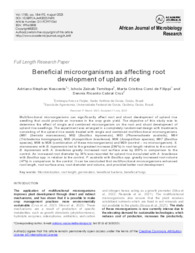Publicações
Beneficial microorganisms as affecting root development of upland rice.
Autoria: NASCENTE, A. S.; TEMITOPE, I. Z.; FILIPPI, M. C. C. de; CRUZ, D. R. C.
Resumo: Multifunctional microorganisms can significantly affect root and shoot development of upland rice seedling that could provide an increase in the crop grain yield. The objective of this study was to determine the effect of single and combined microorganism on the root and shoot development of upland rice seedlings. The experiment was arranged in a completely randomized design with treatments consisting of the upland rice seeds treated with single and combined multifunctional microorganisms (M01 (Serratia marcescens), M02 (Bacillus toyonensis), M03 (Phanerochaete australis), M04 (Trichoderma koningiopsis), M05 (Azospirillum brasilense), M06 (Azospirillum species), M07 (Bacillus species), M08 to M28 (combination of these microorganisms) and M29 (control – no microorganism). S. marcescens with B. toyonensis led to the greatest increase (296%) in root length relative to the control. B. toyonensis with A. brasilense greatly increased root surface area by 209% in comparison to the control. An increased root diameter by 36% was recorded for upland rice inoculated with A. brasilense with Bacillus spp. in relation to the control. P. australis with Bacillus spp. greatly increased root volume (47%) in comparison to the control. It can be concluded that multifunctional microorganisms enhanced root length, root surface area, root diameter and volume, and provided better root development.
Ano de publicação: 2023
Tipo de publicação: Artigo de periódico
Unidade: Embrapa Arroz e Feijão
Palavras-chave: Arroz, Bactéria, Beneficial microorganisms, Fungo, Germination, Length, Microorganisms, Microrganismo, Oryza Sativa, Rice, Roots

